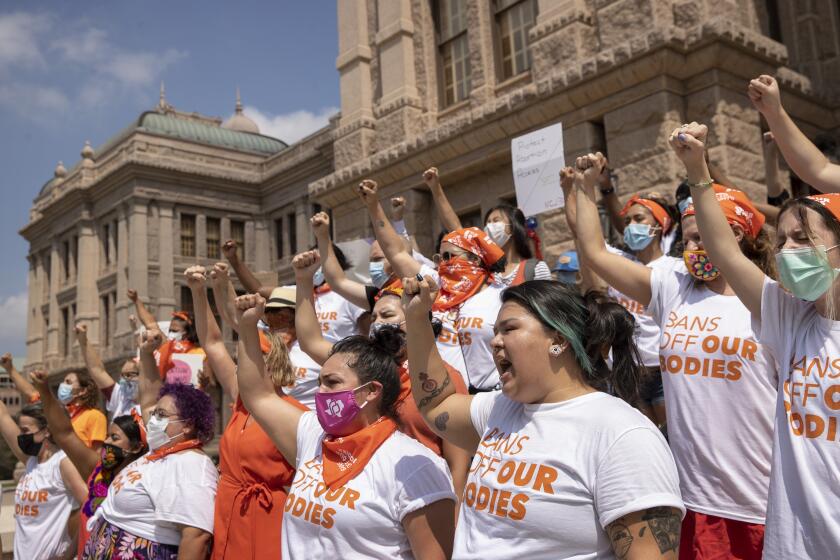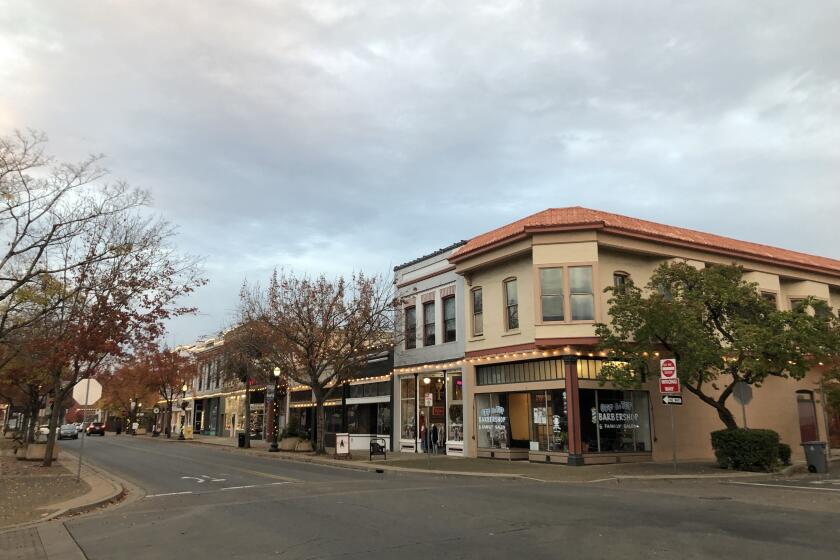Can Beto O’Rourke show Democrats how to lose less badly in rural America?
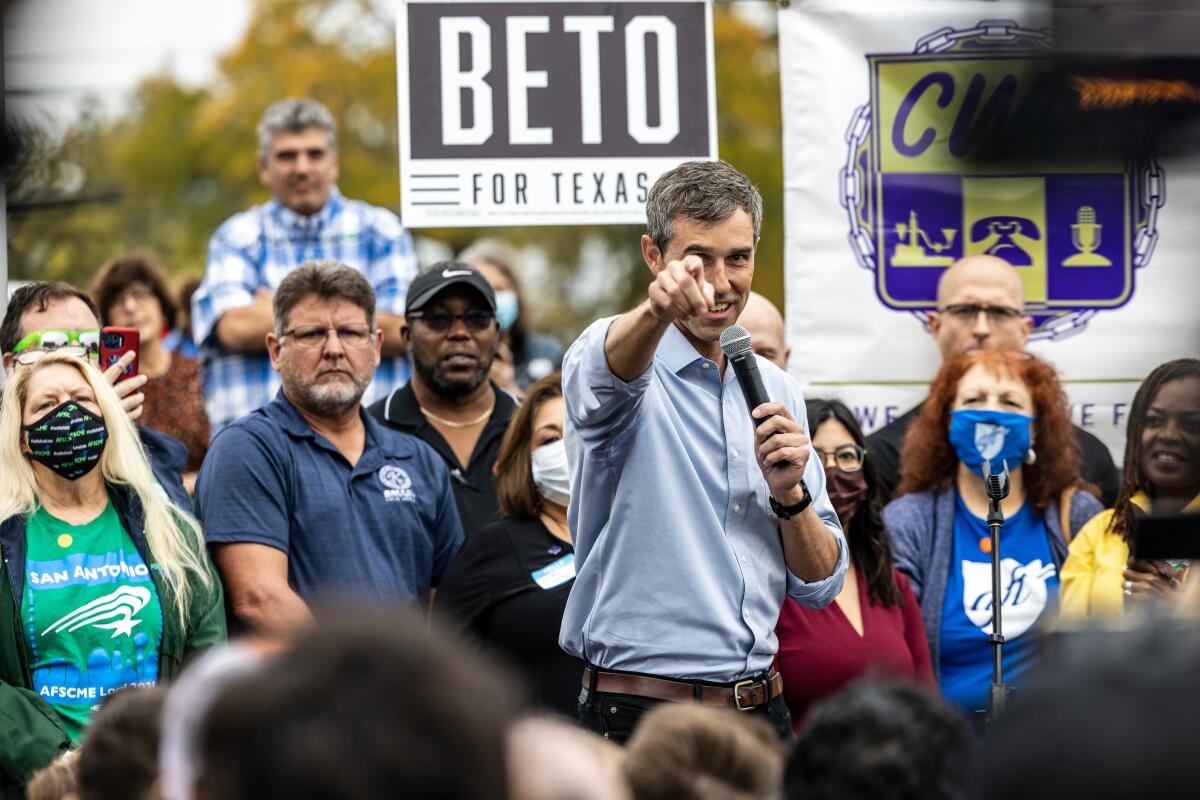
- Share via
DE LEON, Texas — Nobody expects Beto O’Rourke to win Comanche County in the Texas gubernatorial race — least of all, Beto O’Rourke.
Nestled in rolling hills two hours southwest of Dallas-Fort Worth, this patchwork of cotton and hay fields, cattle ranches and the occasional town is rock-ribbed Republican territory; 85% of voters backed President Trump last year. So when O’Rourke pitched his candidacy to 15 of the county’s remaining Democrats, gathered at a roadside diner, he floated a seemingly modest goal: Build from Joe Biden’s lopsided loss here to a slightly less lopsided 20-80.
Royce Lesley, a lifelong Comanche resident and O’Rourke supporter, dared to dream even bigger, positing that if the El Paso Democrat “could get somehow 8 to 10% more of the voters in Comanche and these rural counties to vote for you ... I think that small amount of margin could do it.”
Such is the reality for Democrats in rural America, where success is defined by losing less badly. As O’Rourke launches his second statewide campaign in four years, he’s hoping a go-everywhere approach will both win him the governorship, and help thaw the icy reception in the countryside for candidates with a D behind their names.
But this playbook, which he followed to limited success in his 2018 Senate race, is beset with even more challenges this time. Democratic prospects in rural communities nationwide, which were already dire in recent years, hit new lows after last month’s gubernatorial race in Virginia. Winning GOP candidate Glenn Youngkin didn’t just surpass Trump’s margin of victory in sparsely populated counties, he improved turnout in those areas as well — a potent double whammy.
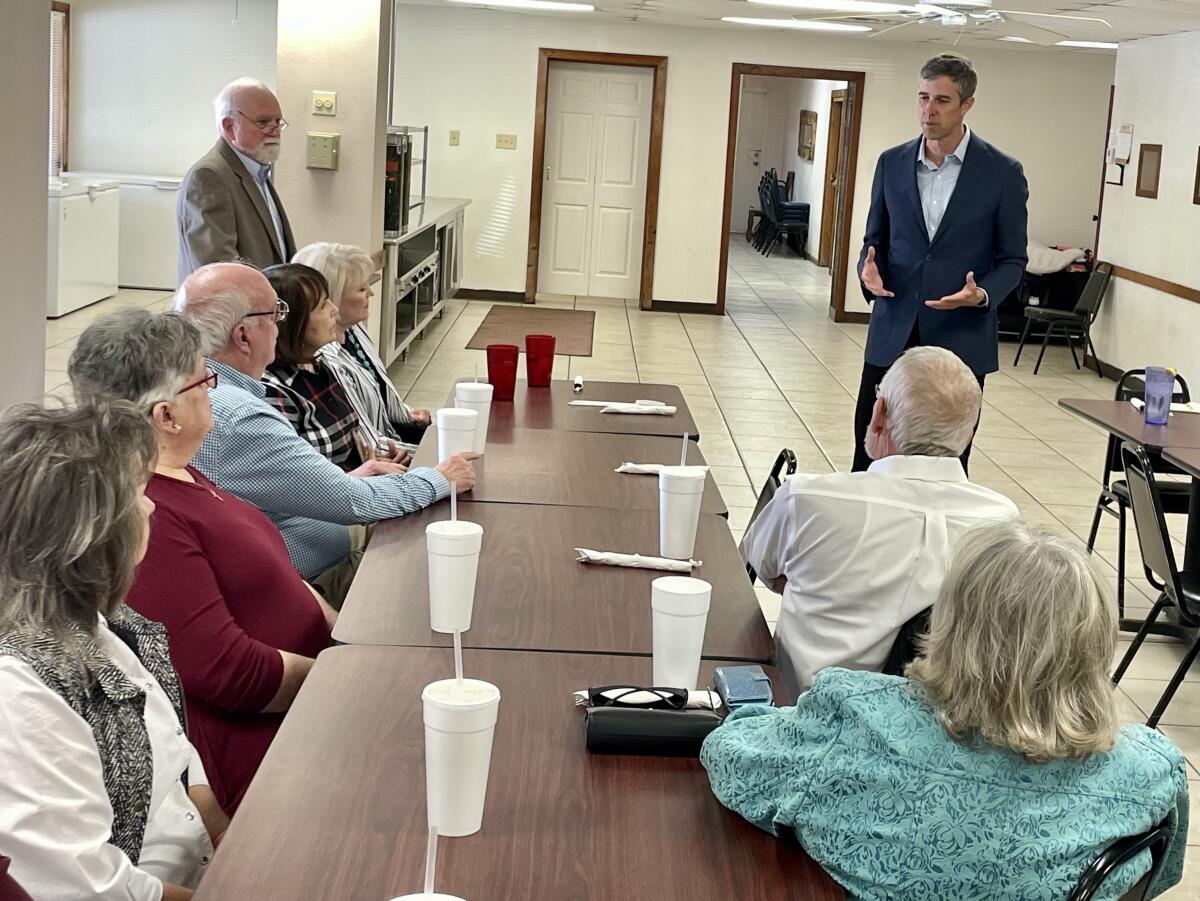
And O’Rourke himself carries more baggage than he did as an upstart candidate, after staking out liberal positions on gun restrictions during his short-lived presidential run.
“I don’t think there’s any clear-eyed assessment that doesn’t see him as the underdog in this race,” said Jim Henson, director of the Texas Politics Project at University of Texas, Austin.
An October poll conducted by the University of Texas/Texas Tribune found O’Rourke trailing his most likely opponent, incumbent GOP Gov. Greg Abbott, 46%-37%. The breakdown was even more skewed among rural residents, who sided with Abbott 67%-18%.
The findings point to a familiar pattern, both in Texas and across the country. Democrats have maintained a solid grip on the state’s urban areas, while the suburbs have emerged as a major battleground. Meanwhile, sparsely populated, predominantly white counties such as Comanche have solidified as a crucial stronghold for the GOP.
“Republicans have been winning the rural areas by 75-25. It’s hard to get better than that,” said Steve Munisteri, former chair of the Republican Party of Texas. “Such a large margin — even though it’s only 11% of the state vote — it’s a significant factor.”
::
The Highway 6 Cafe is in De Leon, Comanche’s second-largest city (population: just shy of 2,300), situated across a two-lane highway from the high school and a tractor dealership. As diners in the main room lunched on a Thanksgiving-themed buffet, O’Rourke parried questions from invited guests in a private back room.
He laid out a campaign that emphasized expanding healthcare, raising teacher pay and improving infrastructure, and, notably, made little mention of national politicians such as Trump or Biden.
But voters were quick to vent their own frustration with Trump and his enduring popularity with their neighbors. Their comments had the cathartic quality of finally being able to speak after months, or years, of biting their tongues.
Conservative legislation and executive actions confounded expectations for Texas as it diversified and attracted Californians.
Being a Democrat in this area “means that you aren’t open with a lot of your friends,” Suzann Thompson, chair of the Comanche County Democrats, explained later that day. “Because they wouldn’t be your friends.”
Lesley, a 74-year-old rancher, was among those sharing his anxiety about “this last guy.” The influence of Trump made him worry about the direction of the country, and left him pessimistic that even a small percentage in his community would be open to O’Rourke’s message.
“He’s right in everything he said. I’m just not sure that’s what’s going to get him over the top,” Lesley said. “It’s God and guns in this part of the world.”
Leaving the friendly confines of the cafe, O’Rourke paused on a leafy residential street to reflect on the value of visiting small red counties, where rural hospital closures and low teacher pay were not just abstract policy issues.
“It’s one thing for me to kind of read about that or hear that,” he said. “It’s another thing to be in the community and just listen to people.”
His words were interrupted by a group of men who had gathered several yards away to heckle him. Their chants got louder and clearer: “Let’s go Brandon” — a coded slogan popular on the right meant to profanely insult Biden — and scattered shouts of “Communist!”
O’Rourke chalked up the incident to the overheated American politics of the moment.
“I’ve lived in Texas my whole life.... I’ve never seen anything like this. I think that is very indicative of the time that we’re in right now,” he said, insisting the best response to this polarization was more forays into conservative areas.
“If I don’t show up in person, then I’m whatever Fox News tells you I am,” he said.
The outlook echoes O’Rourke’s breakout 2018 campaign, where he visited all of Texas’ 254 counties. But while the strategy may have yielded small gains relative to previous Democrats, his rival, Sen. Ted Cruz, was able to rack up enough rural votes to fend off O’Rourke’s strong performance in the cities and suburbs.
Now, in what could be a tough midterm election for Democrats nationwide, Republicans believe O’Rourke in particular is a weakened candidate.
Three years ago, “Beto was a populist outsider. Now he’s an identified Democrat. Worse that that, he’s a liberal progressive Democrat,” said Jeff Roe, a Republican strategist who worked on the Cruz campaign. “Some can stomach a Democrat in Texas if it’s a moderate, bipartisan person. But he’s not that.”
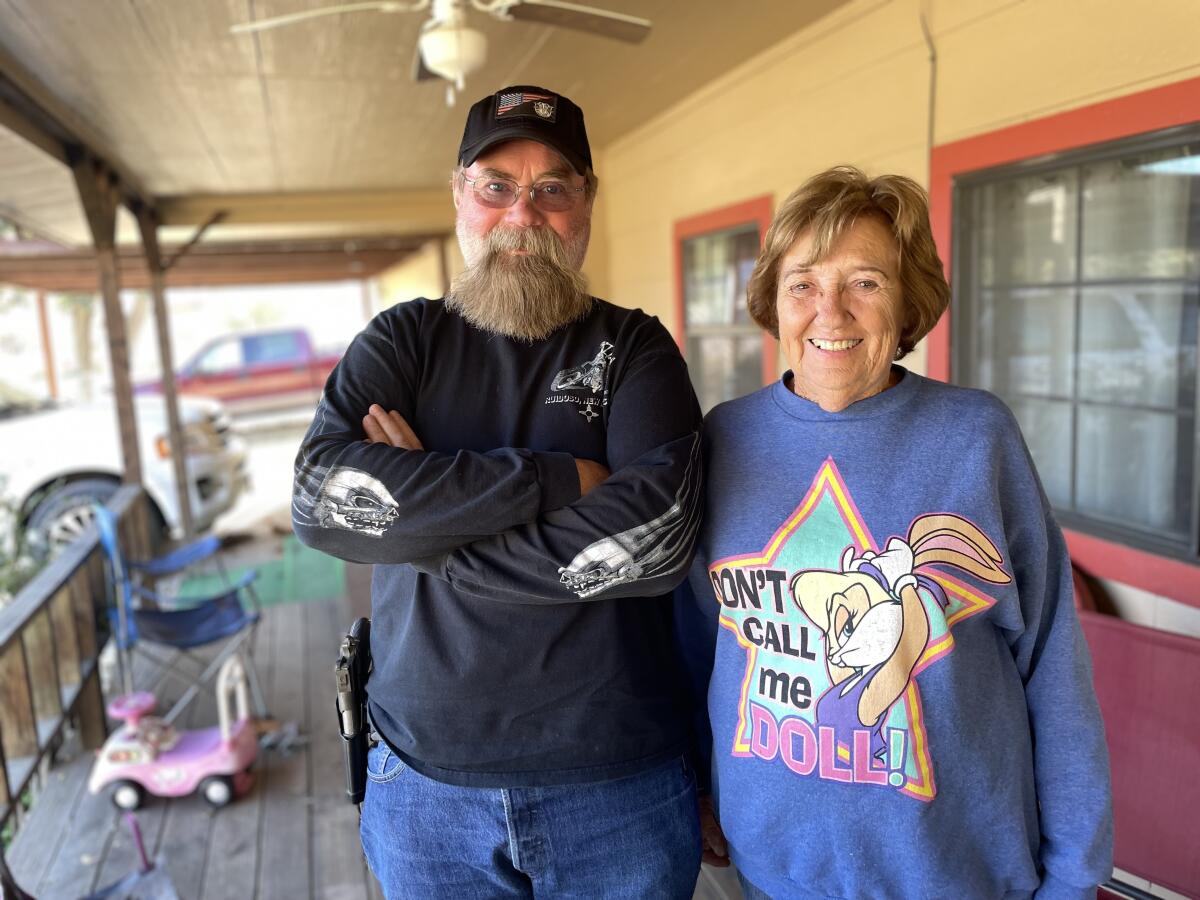
In Comanche County, that perception fed from, as one roundtable participant succinctly said, “the gun issue.” In 2019, not long after 23 people were gunned down in a Walmart in his hometown of El Paso, O’Rourke called for mandatory buybacks of certain semiautomatic rifles.
“Hell yes, we’re going to take your AR-15, your AK-47,” O’Rourke said at the time.
The Democrats at the roundtable pressed O’Rourke to clarify — did he want to take away all guns? O’Rourke assured them his stance only applied to “weapons of war” and assured them of his respect for the 2nd Amendment and responsible gun ownership. But he acknowledged he needed to make that distinction clearer.
Views on his position have already calcified among some in the county, where O’Rourke got just 781 votes, or 17%, in 2018. From her front porch across the street from the cafe, Jan Grisham denounced O’Rourke as a “thief” who wanted to confiscate guns. Her friend Buddy Welch, asked whether he would ever consider voting for O’Rourke, rose from his chair before responding, removed a handgun from his hip holster and set it on a table for a dramatic flourish.
“No,” he said. “I’ve carried one of these for 20 years. And I’m not gonna stop now.”
::
Neither Welch nor Grisham sound like they’d be inclined to vote for any Democrat these days. Grisham, the 78-year-old mayor of De Leon, is against abortion rights and regards vaccine mandates as an assault on freedom. Welch, 67 and retired from the military, wants fewer restrictions on oil drilling and stronger immigration enforcement at the southern border.
All of those stances lead them to the Republican Party.
The Northern California town of Oroville this month declared itself a “constitutional republic” because of COVID-19. Residents have mixed feelings.
But Democrats say their turnaround in these communities is not simply a matter of adopting rural-friendly issues. Signature party initiatives such as expanding healthcare, building out broadband networks and giving child tax credits have so far done little to improve Democrats’ popularity.
“If elections were just based on policy right now, we would absolutely crush it,” said J.D. Scholten, a former congressional candidate from Iowa, who runs a super PAC devoted to improving his party’s performance in rural communities across the country.
Instead, he sees a deeper problem with the party’s brand, citing polling that suggests simply being identified as a Democrat on the ballot can cost a candidate 35 points in rural areas.
Betty Richie, the former chair of the rural council for the Democratic National Committee, adds more challenges to the list: the popularity of conservative television and radio stations, which make it difficult for Democrats’ messages to break through, and the unique trials of campaigning in the countryside that make it tempting for candidates to skip the region altogether.
“It’s not cost-effective. It’s time consuming.... There’s a lot of barbed wire and hogs along the way, and just as you’re getting ready to ask for that vote or that money, your phone goes dead,” said Richie, who lives in Wichita Falls, a small city in north Texas.
The party’s steep uphill climb may strike some liberals as wasted effort — especially as rural America’s population shrinks and its conservatism hardens. But if Democrats focus only on their urban strongholds and shoring up their wobbly suburban support, they risk letting Republicans rack up imposing margins.
That’s where Thompson, the Comanche County Democratic chair, sees her mission — staving off complete collapse so that future Democrats in her county won’t have to start from scratch.
“We need to just hold the line,” she said. “Do what Beto said — maybe see if we can increase our Democratic turnout by 5% or 6%. And just keep going at it a little at a time.”
More to Read
Get the L.A. Times Politics newsletter
Deeply reported insights into legislation, politics and policy from Sacramento, Washington and beyond. In your inbox three times per week.
You may occasionally receive promotional content from the Los Angeles Times.
